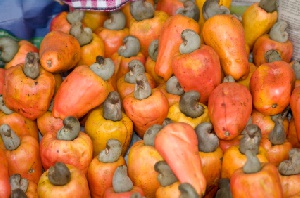Ms Rita Weidinge, Executive Director of African Cashew Initiative (ACI), has called on African governments to invest in the production and policy development of the cashew sector, to increase economic value and enhance private investment.
She noted that it is imperative for Africa to put in place consistent and coherent strategy in the value chain by investing in research for the growth of the sector.
Ms Weidinge made the call at the weekend in Accra at a consultation of African Public and technical Actors in Cashew on the theme: "Opportunities of the African cashew sector”.
The workshop brought together public officials from the ministries related to the cashew sector, public Pan-African actors: African Union Commission and Regional Economic Communities.
In attendance are financial institutions delegates and other technical partners, including the African Development Bank, Food and Agriculture Organisation, United Nations Industrial Development Organisation, United Nation Development Programme, Federal Ministry for Economic Cooperation and Development and International Trade Centre.
She explained that investment in the sector is critical because of the growing demand for the world’s favourite nut, adding that in the past 10 years, cashew consumption in India had doubled while that of Europe had grown by 30 per cent.
Ms Weidinge noted that if African governments would implement good agricultural practices and adopt improved planting materials, African cashew farmers have a great opportunity to increase yields and feed the new processing plants.
She said Africa accounts for 38 per cent of global cashew production, but only five per cent of global processing and that through local processing, there is value addition potential of 2.8 billion dollars every year and potential employment of 275,000 people in the processing plants.
The Executive Director noted that ACI envisage triple processing volumes by 2020 working with and supporting commercial investment and private capital.
“ It is important to invest in the sector because of a strong network with the objective of increasing processing of cashews in Africa, improving competitiveness, sustainability and growth in the industry” , she added.
“ACI has introduced a Cashew Matching Fund, an effective instrument for private ownership that offers an opportunity for structured investment in the sector scaling up on activities such as farmer linkages and market information systems”.
She said about 400,000 farmers have been trained with 22 per cent of women to increase their income as well as create job opportunity for the youth.
“To meet the demand for cashew, African production needs to grow on an average by eight per cent to 15 per cent per annum from now to 2018 and beyond”.
She said even though climate change is among the factors affecting the industry, the ACI has established a cashew master training programme to address some of the regional problems facing the sector.
Mr Seth Osei Akoto, Deputy Director in charge of Cashew, Ministry of Food and Agriculture, said the cashew industry has real potential for developing value chains and creating job opportunities and fighting against poverty.
Mr Akoto called for concerted efforts to explore ideas and strategies in supporting the cashew value chain activities even though 90 per cent of raw cashew nuts leave the shores of the country.
Mr Christoph Rauh, German Federal Minister of Economic Cooperation and Development, said his outfit has supported the growth of agriculture in several African countries because of potential of creating wealth and jobs for the countries.
He urged authorities to implement policies in agricultural development by ‘walking the talk’ adding that for the sector to succeed there is the need for partnership on a regional basis.
Click to view details



Business News of Sunday, 17 April 2016
Source: GNA
African governments urged to invest in cashew industry
Entertainment
















